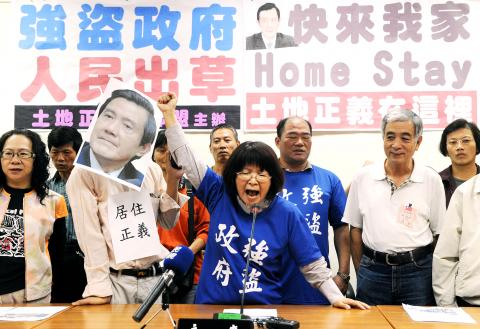Land owners and activists yesterday staged a protest at the legislature in Taipei, accusing the government of reneging on its promise and abruptly passing proposed revisions to the Land Expropriation Act (土地徵收條例) to second reading without prior discussion.
They also expressed their concern that the Cabinet-proposed revisions might eventually be adopted, as the Chinese Nationalist Party (KMT) enjoys an absolute majority in the legislature.
Following a slew of protests over government seizure of private land for development projects around the country, President Ma Ying-jeou (馬英九) and Premier Wu Den-yih (吳敦義) made several promises to amend the Land Expropriation Act, including requiring land developers to clearly state that they are necessary and how the project would uphold public interests.

Photo: CNA
However, the amendments proposed by the Cabinet did not include such clauses and only aim to change the basis for calculation of compensation for landowners from published prices to market prices.
Landowners and other advocacy groups said the proposed revisions should also include the participation of a third-party expert when estimating the land value.
In a bid to ensure that the amendments are passed before the legislative election in January, the Legislative Yuan — under the KMT’s lead — decided to skip initial discussions in the first reading and pushed the proposal straight into second reading.
“The KMT put the amendments directly into second reading to avoid discussions in the Internal Administration Committee,” Democratic Progressive Party (DPP) Legislator Tien Chiu-chin (田秋堇) told a news conference at the Legislative Yuan. “With its absolute majority, the KMT could pass the amendments despite opposition, and the expectations of landowners, farming activists and other rights advocacy groups would be sacrificed.”
“While Ma is having his ‘homestay’ tour around the country for his re-election campaign, I invite the president to stay at my house and the homes of all land expropriation victims,” Metro A7 Station Development Project Self-Help Group chairwoman Hsu Yu-hung (徐玉紅) said. “He should stay with us, eat with us, work with us, be treated by us and hear what we have to say.”
The expropriation project is part of the “A7 station of the Taoyuan International Airport MRT development project,” which aims to build affordable housing units and an industrial zone near the temporarily named “A7 station” on the planned Taoyuan International Airport MRT line connecting central Taipei and Taoyuan County.
A tearful Peng Hsiu-chun (彭秀春), a resident of Dapu Borough (大埔), Jhunan Township (竹南), said she was saddened when she received an official notice from the Miaoli County Government informing her that her home was to be taken over for a science park project.
“The house that I live in is the product of a lifetime of hard work by me and my family,” she said. “The legislature should revise the Land Expropriation Act according to the people’s voices, so that no one in this country would live in constant fear of having their property taken away by the government.”
Wang Wan-ying (王婉盈), a resident of Houli District (后里) in Greater Taichung, whose house was torn down to make way for Phase 3 of the Central Taiwan Science Park, said that if the government was sincere about increasing the nation’s self-sufficiency in food, “it should stop taking over farmlands for development projects.”

The manufacture of the remaining 28 M1A2T Abrams tanks Taiwan purchased from the US has recently been completed, and they are expected to be delivered within the next one to two months, a source said yesterday. The Ministry of National Defense is arranging cargo ships to transport the tanks to Taiwan as soon as possible, said the source, who is familiar with the matter. The estimated arrival time ranges from late this month to early next month, the source said. The 28 Abrams tanks make up the third and final batch of a total of 108 tanks, valued at about NT$40.5 billion

Two Taiwanese prosecutors were questioned by Chinese security personnel at their hotel during a trip to China’s Henan Province this month, the Mainland Affairs Council (MAC) said yesterday. The officers had personal information on the prosecutors, including “when they were assigned to their posts, their work locations and job titles,” MAC Deputy Minister and spokesman Liang Wen-chieh (梁文傑) said. On top of asking about their agencies and positions, the officers also questioned the prosecutors about the Cross-Strait Joint Crime-Fighting and Judicial Mutual Assistance Agreement, a pact that serves as the framework for Taiwan-China cooperation on combating crime and providing judicial assistance, Liang

A group from the Taiwanese Designers in Australia association yesterday represented Taiwan at the Midsumma Pride March in Melbourne. The march, held in the St. Kilda suburb, is the city’s largest LGBTQIA+ parade and the flagship event of the annual Midsumma Festival. It attracted more than 45,000 spectators who supported the 400 groups and 10,000 marchers that participated this year, the association said. Taiwanese Designers said they organized a team to march for Taiwan this year, joining politicians, government agencies, professionals and community organizations in showing support for LGBTQIA+ people and diverse communities. As the first country in Asia to legalize same-sex

MOTIVES QUESTIONED The PLA considers Xi’s policies toward Taiwan to be driven by personal considerations rather than military assessment, the Epoch Times reports Chinese President Xi Jinping’s (習近平) latest purge of the Chinese People’s Liberation Army (PLA) leadership might have been prompted by the military’s opposition to plans of invading Taiwan, the Epoch Times said. The Chinese military opposes waging war against Taiwan by a large consensus, putting it at odds with Xi’s vision, the Falun Gong-affiliated daily said in a report on Thursday, citing anonymous sources with insight into the PLA’s inner workings. The opposition is not the opinion of a few generals, but a widely shared view among the PLA cadre, the Epoch Times cited them as saying. “Chinese forces know full well that